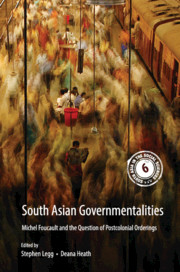Book contents
- Frontmatter
- Contents
- Acknowledgements
- Introductions
- Histories and Presents
- Subjects and Matters
- 7 Do Elephants Have Souls? Animal Subjectivities and Colonial Encounters
- 8 Plastic History, Caste and the Government of Things in Modern India
- 9 Changing the Subject: From Feminist Governmentality to Technologies of the (Feminist) Self
- 10 The Tortured Body: The Irrevocable Tension between Sovereign and Biopower in Colonial Indian Technologies of Rule
- Reflection
- Contributors
- Index
10 - The Tortured Body: The Irrevocable Tension between Sovereign and Biopower in Colonial Indian Technologies of Rule
from Subjects and Matters
Published online by Cambridge University Press: 28 October 2018
- Frontmatter
- Contents
- Acknowledgements
- Introductions
- Histories and Presents
- Subjects and Matters
- 7 Do Elephants Have Souls? Animal Subjectivities and Colonial Encounters
- 8 Plastic History, Caste and the Government of Things in Modern India
- 9 Changing the Subject: From Feminist Governmentality to Technologies of the (Feminist) Self
- 10 The Tortured Body: The Irrevocable Tension between Sovereign and Biopower in Colonial Indian Technologies of Rule
- Reflection
- Contributors
- Index
Summary
Michel Foucault has explored the ways in which, beginning in the eighteenth century, punishment started to become ‘the most hidden part of the penal process’ and justice ceased to take ‘public responsibility for the violence that is bound up with its practice’ (Foucault, 1979, 9). For Foucault this signalled the emergence of biopower – or the power over life, in contrast to the sovereign power over death – in the operation of penal practices, and with it a shift away from corporal punishment to incarceral disciplining. Although Foucault locates the emergence of such a penological model in Europe, scholars of colonialism have argued that it was part of a larger disciplinary and regulatory regime that emerged through interconnections between Europe and its colonies (Bhattacharya, 2009, 10). In the case of colonial India, as in other colonial contexts, biopolitical technologies facilitated the gradual demise of public execution in the early nineteenth century and the replacement of forms of punishment such as torture and mutilation with labour. But the rationale for such transformations in penal practices, while in part driven by the urge to manage the Indian population, was also fostered by concerns about the need to ameliorate Indian ‘habits’ and ‘prejudices’ and allay anxieties regarding colonial governance (Bhattacharya, 2009, 11).
Yet, in spite of such concerns, torture did not disappear as a mode of punishment in colonial India. While torture was a punishment that could be inflicted for certain offences under Muslim law, such provisions had largely been eradicated from Indian legal practice by the early nineteenth century, barring the infliction of whipping. Although the Indian Penal Code, which came into effect in 1862, abolished whipping as a form of punishment, it was re-introduced two years later through the Whipping Act. According to Sir Charles Trevelyan, Finance Member of the Indian government, the act, which provided for sentences of up to 150 stripes for committing a variety of offences, served to ‘establish and legalise torture throughout India’ (Macpherson, 1864, 24). Such ‘judicial torture’ was, moreover, liberally applied as a means of managing ‘disorder’ (from offences such as stealing a tiffin box or a pair of shoes or, in one notorious case, a flower from a public park), often on starved and emaciated bodies.
- Type
- Chapter
- Information
- South Asian GovernmentalitiesMichel Foucault and the Question of Postcolonial Orderings, pp. 224 - 246Publisher: Cambridge University PressPrint publication year: 2018
- 2
- Cited by



